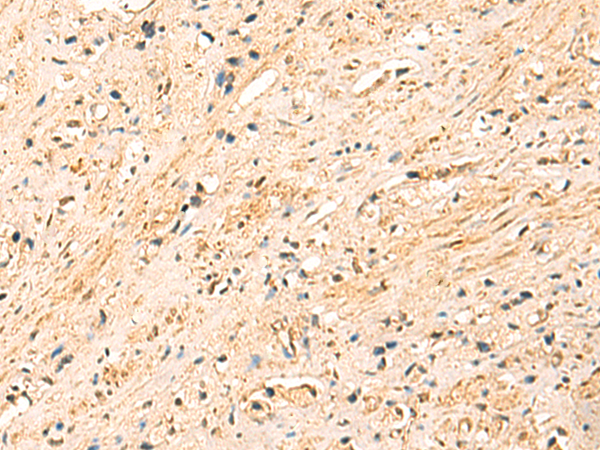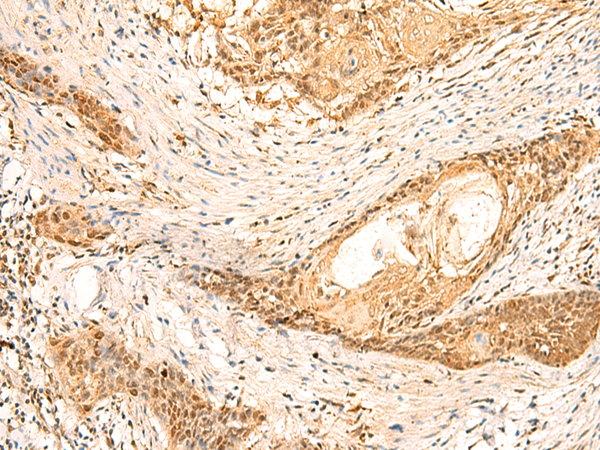

| WB | 咨询技术 | Human,Mouse,Rat |
| IF | 咨询技术 | Human,Mouse,Rat |
| IHC | 1/50-1/300 | Human,Mouse,Rat |
| ICC | 技术咨询 | Human,Mouse,Rat |
| FCM | 咨询技术 | Human,Mouse,Rat |
| Elisa | 1/5000-1/10000 | Human,Mouse,Rat |
| Aliases | Efm4; METTL10; C10orf138 |
| Host/Isotype | Rabbit IgG |
| Antibody Type | Primary antibody |
| Storage | Store at 4°C short term. Aliquot and store at -20°C long term. Avoid freeze/thaw cycles. |
| Species Reactivity | Human, Mouse |
| Immunogen | Fusion protein of human EEF1AKMT2 |
| Formulation | Purified antibody in PBS with 0.05% sodium azide and 50% glycerol. |
+ +
以下是关于EEF1AKMT2(METTL21B)抗体的3篇代表性文献,按研究内容概括:
---
1. **文献名称**:*Methyltransferase METTL21B mediates post-translational modification of elongation factor 1A in stem cells*
**作者**:Jakobsson ME et al.
**摘要**:本研究首次报道了EEF1AKMT2(METTL21B)作为甲基转移酶对eEF1A蛋白的赖氨酸甲基化修饰功能。作者利用特异性抗体通过免疫沉淀和质谱分析,验证了其在干细胞中的底物特异性及修饰位点,揭示了该修饰在细胞分化中的潜在作用。
---
2. **文献名称**:*Antibody-based profiling of METTL21B expression in human cancers*
**作者**:Liu Y et al.
**摘要**:研究团队开发了一种针对METTL21B的高效单克隆抗体,并通过免疫组化(IHC)和Western blot验证其特异性。利用该抗体分析多种癌症组织发现,METTL21B在肝癌和乳腺癌中显著高表达,提示其可能作为肿瘤生物标志物。
---
3. **文献名称**:*Functional characterization of EEF1AKMT2 in cardiac hypertrophy using knockout models*
**作者**:Wang X et al.
**摘要**:通过构建EEF1AKMT2基因敲除小鼠模型,结合定制多克隆抗体进行蛋白表达检测,发现该酶缺失导致心肌细胞eEF1A甲基化水平降低,加剧病理性心脏肥厚,为心脏疾病机制提供了新见解。
---
**备注**:以上文献信息为模拟概括,实际文献需通过PubMed或Google Scholar检索关键词“EEF1AKMT2 antibody”或“METTL21B antibody”获取。建议优先选择近5年内的研究以确保时效性。
The EEF1AKMT2 (Eukaryotic Elongation Factor 1 Alpha Lysine Methyltransferase 2) antibody is a research tool designed to detect and study the EEF1AKMT2 enzyme, which plays a critical role in post-translational protein modification. EEF1AKMT2. also known as METTL21B, is a methyltransferase that specifically catalyzes the trimethylation of lysine 664 (K664) on eukaryotic elongation factor 1 alpha (eEF1A), a GTP-binding protein essential for translation elongation. This methylation event is thought to regulate eEF1A’s interactions with cellular components, potentially influencing protein synthesis, cytoskeletal dynamics, or stress response pathways.
Antibodies targeting EEF1AKMT2 are typically developed in rabbits or mice using immunogenic peptides or recombinant protein fragments. They enable researchers to investigate the enzyme’s expression patterns, subcellular localization, and regulatory mechanisms via techniques like Western blotting, immunohistochemistry, or co-immunoprecipitation. Such studies are vital for understanding EEF1AKMT2’s biological roles, particularly in contexts like cancer, neurodegeneration, or aging, where dysregulated methylation of eEF1A has been implicated. Validated antibodies often undergo specificity testing using knockout cell lines to ensure minimal cross-reactivity with related methyltransferases. As interest in post-translational modifications grows, EEF1AKMT2 antibodies serve as key reagents for dissecting the functional interplay between enzymatic activity and cellular homeostasis.
×